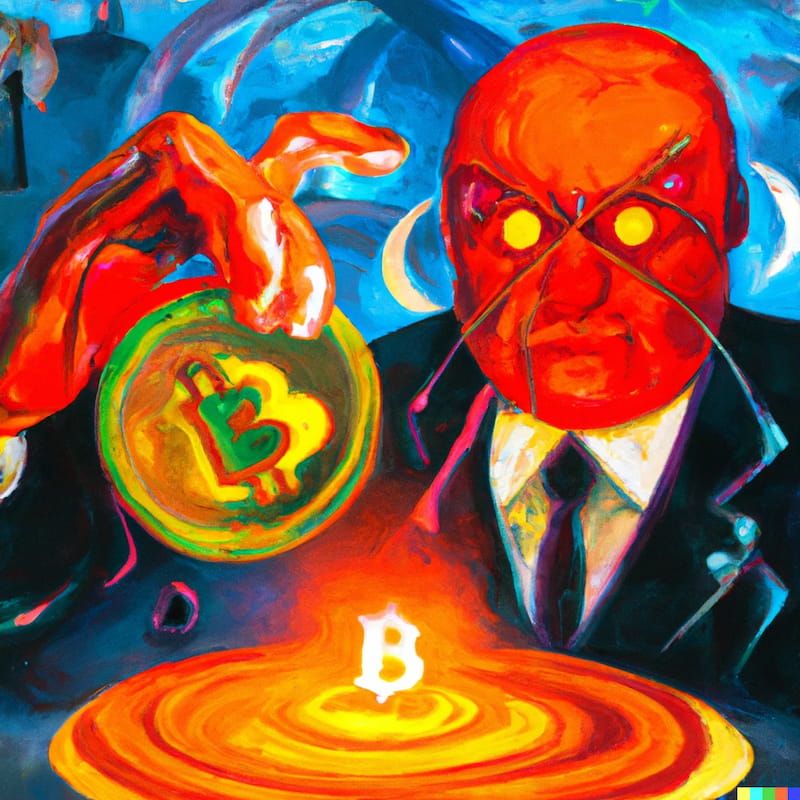The ETF special, or: the battle for Bitcoin’s soul

Once again, it seems crypto’s fate rests in the hands of US regulators.
On the 15th of June BlackRock applied to the Securities and Exchange Commission (SEC) – yes that same SEC that just sued Coinbase and Binance – for permission to create a Bitcoin Exchange Traded Fund (ETF).
If you’ve been following crypto news, you’ll probably know that investment firms have been asking the SEC if they can create a Bitcoin ETF for a decade now.
There have been about 30 attempts in total. And so far, every single one has been rejected. Some of them have even been rejected more than once.
So, what’s changed?
In truth, no one really knows. But here’s what we do know:
BlackRock is the biggest asset manager in the world, with more than $9 trillion of assets under management.
To put that into perspective, $9 trillion is more than the nominal Gross Domestic Product (GDP) of every country in the world, except for the US and China.
So to say BlackRock has clout would be an understatement.
Then there’s the fact that out of the 576 ETFs BlackRock has applied for 575 of them have been approved. That’s a 99.8% approval rating.
Up until now, the SEC has usually rejected Bitcoin ETFs because, in the SEC’s eyes, they don’t do enough to prevent fraud and manipulation.
(It has, however, approved a number of Bitcoin futures ETFs. But Bitcoin futures ETFs don’t actually hold Bitcoin, they hold contracts for Bitcoin futures, so they don’t count.)
And on this front, BlackRock has an ace up its sleeve.
From the Financial Times:
[BlackRock’s] application is also subtly different from those that have gone before. The chief difference is that the Nasdaq exchange, where the iShares Bitcoin Trust would be listed, “is expecting to enter into a surveillance-sharing agreement with an operator of a United States-based spot trading platform for bitcoin”.
In previous rejections the SEC has said a deal on surveillance “with a regulated market of significant size” was one way for an applicant to meet its obligations to prevent fraud and manipulation in the underlying market.
Coinbase is the proposed custodian for the fund and widely expected to be BlackRock’s chosen exchange.
“If Nasdaq is able to enter into an agreement with an exchange such as Coinbase, that could theoretically clear a pathway towards approval since it would directly address the SEC’s main concern”, allowing regulators “to monitor for and pursue bad actors”, said Nate Geraci, president of the ETF Store, a financial adviser.
Okay, a couple of things to unpack there.
Firstly, BlackRock’s ace is that it will have a “surveillance-sharing” agreement with Nasdaq, which should – should! – help with the SEC’s “fraud and manipulation” objections.
The second is that Coinbase is BlackRock’s proposed custodian. Yes, that same Coinbase that the SEC is currently suing for allegedly being an unregistered securities exchange.
Yeah…
So, although the BlackRock Bitcoin ETF application has dragged Bitcoin out of the dirt and put it back over $30,000, there’s absolutely no guarantee it will get approved.
And given the SEC’s all-out war on crypto, no one really knows what will happen.
On the one hand, BlackRock wouldn’t apply for an ETF unless it was pretty sure it would be approved.
On the other the SEC has rejected 100% of past Bitcoin ETF proposals, including one by the world’s third biggest asset manager, Fidelity. So BlackRock’s clout isn’t really anything new here.
Every time it cites investor projection, fraud and manipulation as reasons for its rejection. And every time, the companies that file for spot Bitcoin ETFs point out that it’s allowed Bitcoin futures ETFs which, in theory, have exactly the same issues.
So, the thing to remember here is, the SEC isn’t logical in its decision making about these ETFs, and it doesn’t have to justify itself to anyone.
(In theory it has to justify itself to the US government, but since the whole FTX debacle, no one in the US government is likely to take issue with the SEC denying Bitcoin ETF applications on a whim.)
It’s like when a parent tells a kid they can’t do something.
The kid keeps asking “why?”
Eventually the exasperated parent resorts to simply shouting, “because I SAY SO. THAT’S WHY!”.
And how can you argue with that?
That’s exactly how the past 30 Bitcoin ETF applications have gone so far.
Why is a Bitcoin futures ETF less open to fraud and manipulation than a Bitcoin spot ETF?
And why does an ETF based on a complicated and highly volatile financial derivative of an asset offer better protection to investors than an ETF simply based on the spot price of that same asset?
Because the SEC says so! That’s why.
So what are the chances of BlackRock succeeding?
Become a premium member to read the rest of this article
As a premium member, you’ll get access to all our deep dives, features and guides, as well as our premium newsletter.
SubscribeAlready have an account? Log in



